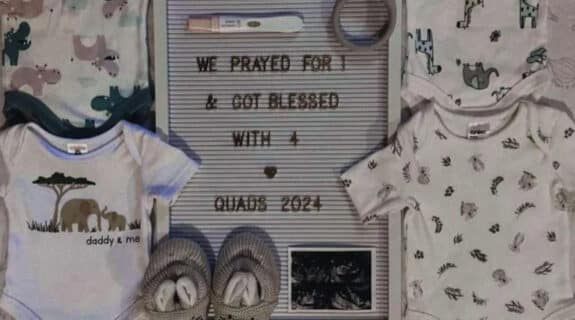A young woman in Australia was shocked to learn that she is expecting quadruplets naturally, resulting in two sets of identical twins. Ebony Apps, 23, and her partner Jayden Cornish, 21, are eagerly awaiting the arrival of their four babies in April.
The couple had previously experienced the heartbreak of two miscarriages, making this news even more surprising and joyous for them. During an interview on Sunrise, Ebony expressed her excitement and gratitude for the unexpected pregnancy.
Jayden, the soon-to-be father, shared that during their first scan, they were informed they would be having twins. It wasn’t until their fourth visit that they received the life-changing news about the quads. The reality of the situation has only recently sunk in for him.
Describing the pregnancy as a miracle, Ebony created a Gofundme page to help cover the expenses associated with having four infants. She expressed her thankfulness for any donations, emphasizing that they would be used to create a new life for their growing family.
The rarity of Ebony’s pregnancy was highlighted by the fact that ultrasound professionals with decades of experience had never seen such a case before. According to Silje Andersen-Cooke from the Australian Multiple Birth Association, there are typically only 52 ‘higher order’ births annually in Australia.
Ms. Andersen-Cooke explained that quadruplets are extremely rare and that only 1.4% of births in Australia involve multiple babies. Most of these are twins, with higher-order births accounting for just 2%. The birth of quadruplets consisting of two sets of identical twins happens only about once a year. The chances of conceiving quadruplets naturally are 1 in 700,000 pregnancies. It is estimated that two eggs split to create two sets of identical twins only occurs once in 70 million births.
Women carrying higher-order pregnancies are more susceptible to pregnancy risks, and premature birth is common.
For quadruplets, the average gestation is 30 weeks. Thankfully with today’s advances in neonatal care, ninety-eight percent of babies born at 30 weeks gestation will survive.
Last year Michael and Hannah Carmack welcomed a similar set of quadruplets at the UAB Women and Infants Center in Birmingham. The pair of identical twins — girls Evelyn and Adeline, and boys David and Daniel — were born via Cesarean section at 27 weeks gestation.
We hope Ebony and Jayden’s journey is filled with health and happiness.
Related Articles:







